Tables: Please take a look here to see tables. How to query counting specific wins of team and find the winner of the series
Questions:
- How to make query more optimize?
- How to reduce query redundancy?
- How to make this query more faster?
Summary
As you can see in the example query this part is use many times.
WHERE leagueid = 2096
AND start_time >= 1415938900
AND ((matches.radiant_team_id= 1848158 AND matches.dire_team_id= 15)
OR (matches.radiant_team_id= 15 AND matches.dire_team_id= 1848158))
SELECT matches.radiant_team_id,
matches.dire_team_id,
matches.radiant_name,
matches.dire_name,
TA.Count AS teamA,
TB.Count AS teamB,
TA.Count + TB.Count AS total_matches,
SUM(TA.wins),
SUM(TB.wins),
(CASE
WHEN series_type = 0 THEN 1
WHEN series_type = 1 THEN 2
WHEN series_type = 2 THEN 3
END) AS wins_goal
FROM matches
LEFT JOIN
(SELECT radiant_team_id,
COUNT(id) AS COUNT,
CASE
WHEN matches.radiant_team_id = radiant_team_id && radiant_win = 1 THEN 1
END AS wins
FROM matches
WHERE leagueid = 2096
AND start_time >= 1415938900
AND ((matches.radiant_team_id= 1848158
AND matches.dire_team_id= 15)
OR (matches.radiant_team_id= 15
AND matches.dire_team_id= 1848158))
GROUP BY radiant_team_id) AS TA ON TA.radiant_team_id = matches.radiant_team_id
LEFT JOIN
(SELECT dire_team_id,
COUNT(id) AS COUNT,
CASE
WHEN matches.dire_team_id = dire_team_id && radiant_win = 0 THEN 1
END AS wins
FROM matches
WHERE leagueid = 2096
AND start_time >= 1415938900
AND ((matches.radiant_team_id= 1848158
AND matches.dire_team_id= 15)
OR (matches.radiant_team_id= 15
AND matches.dire_team_id= 1848158))
GROUP BY dire_team_id) AS TB ON TB.dire_team_id = matches.dire_team_id
WHERE leagueid = 2096
AND start_time >= 1415938900
AND ((matches.radiant_team_id= 1848158
AND matches.dire_team_id= 15)
OR (matches.radiant_team_id= 15
AND matches.dire_team_id= 1848158))
GROUP BY series_id
Scheduled Matches
ID| leagueid| team_a_id| team_b_id| starttime
1| 2096| 1848158| 15| 1415938900

